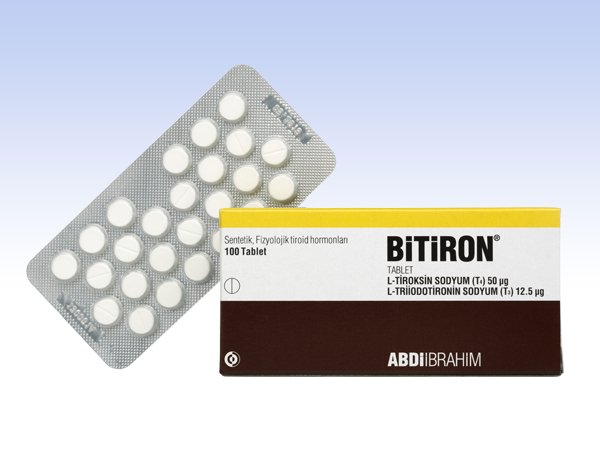Bitiron T3-T4 mix Abdi Ibrahim sale
Product Description
Bitiron T3-T4 mix Abdi Ibrahim
Bitiron 100 Tabs 50 mcg (T3-T4 mix)
Abdi Ibrahim
Bitiron 100 Tablets 50 mcg (T3-T4 mix) Abdi Ibrahim Review
BITIRON is available in blister packs of 50 and 100 tablets. The medication is from the group of medication called thyroid hormones and As busy chemical, Bitrion includes L-tiroksin sodyum (T4) and L-triiodotironin sodyum (T3). Trainers, particularly bodybuilders normally employs this medication for burning off fat. It’s used to get thetreatmentt of,
– Thyroid hormone deficiency and to the Development of the thyroid gland, Irrespective of iodine deficiency (prolonged interval of thyroid hormone deficiency and excess drop of their body temperature, also for myxoedema, a disorder may Lead to underdevelopment of their body or retardation because of iodine deficiency)
– For Restraining the hormone called thyroid stimulating hormone (TSH), which is secreted in the Adrenal gland,
– Underdeveloped thyroid gland, partly or as an entire lacking of thyroid gland
– For analysis purposes when employing the thyroid test,
– To prevent recurrence following operation
– Thyroid Hormone Deficiency Due to the malfunction of the Thyroid Gland
– Deficiency of this thyroid gland as a result of pituitary or hypothalamus ailments.
Bitiron is a synthetically derived thyroid hormone replacement preparation. It consists of levothyroxine sodium (thyroxine, T4) and liothyronine sodium (triiodothyronine, T3) in a 4 to 1 ratio by weight. Liotrix was developed when it was believed that serum levels of both T4 and T3 were maintained by direct thyroidal secretion. It is now known that the thyroid gland secretes approximately ten times more T4 than T3 and that 80% of serum T3 is derived from deiodination of T4 in peripheral tissues. Administration of levothyroxine alone is sufficient for maintaining serum T4 and T3 levels in most patients and combination hormone replacement therapy generally offers no therapeutic advantage. In fact, administration of T3 may result in supratherapeutic levels of T3.
Description BITIRON, Abdi Ibrahim, Turkey
When used to treat mild to moderate hypothyroidism, the average replacement dose of levothyroxine sodium is approximately 1.7 mcg/kg/day. This equates to 100-125 mcg/day per day for a 154lb adult. The full therapeutic dose may be given from the onset of therapy in otherwise healthy adult patients. Note that due to the long half-life of levothyroxine, the peak therapeutic effect at a given dose may not be achieved for 4 to 6 weeks.
When used (off-label) to accelerate fat loss by bodybuilders and athletes, the typical protocol involves slow buildup of the dosage so that the body has ample time to adjust to the changing thyroid hormone levels. An individual will generally start with a low dosage of 25-50 mcg, and will slowly increase the amount 25-50 mcg each day or two. The final dosage will usually be in the range of 100-150 mcg, and will rarely exceed 250 mcg. It is important to remember that thyroid drugs are strong medications with significant side effect potential. Cautious individuals will be sure not to use excessive amounts of levothyroxine sodium, nor continue treatment for longer than eight weeks. It is also generally advised to also reduce the Synthroid dosage gradually at the conclusion of each cycle. This is usually accomplished by dropping the dosage by 25 mcg every second or third day. The focus here, again, is to help avoid any sudden change in hormone levels that might otherwise trigger side effects. Note that due to the slow acting nature of levothyroxine sodium, it may take several weeks or longer for the active drug to be fully eliminated from the body.
Indications:
May be used to treat primary, secondary or tertiary hypothyroidism. May also be used to suppress thyroid stimulating hormone (TSH) secretion in patients with simple (nontoxic) goiter, subacute or chronic lymphocytic thyroiditis multinodular goiter, and in the management of thyroid cancer. May be used in conjunction with other antithyroid agents to treat thyrotoxicosis to prevent goitrogenesis and hypothyroidism. May also be used for differential diagnosis of suspected mild hyperthyroidism or thyroid gland autonomy.
Pharmacodynamics:
Thyroid hormone drugs are natural or synthetic preparations containing T4 or T3 or both. T4 and T3 are produced in the human thyroid gland by the iodination and coupling of the amino acid tyrosine. Liotrix is a synthetic preparation of T4 and T3 in a 4:1 weight-based ratio. These hormones enhance oxygen consumption by most tissues of the body and increase the basal metabolic rate and the metabolism of carbohydrates, lipids and proteins. Thus, they exert a profound influence on every organ system in the body and are of particular importance in the development of the central nervous system.
Mechanism of action:
The hormones, T4 and T3, are tyrosine-based hormones produced by the thyroid gland. Iodine is an important component in their synthesis. The major secreted form of thyroid hormone is T4. T4 is converted T3, the more active thyroid hormone, by deiodinases in peripheral tissues. T3 acts in the body to increase basal metabolic rate, alter protein synthesis and increase the body’s sensitivity to catecholamines (such as adrenaline). Thyroid hormones are essential for proper development and differentiation of all cells of the human body. T4 and T3 regulate protein, fat and carbohydrate metabolism to varying extents. The most pronounced effect of the hormones is in altering how human cells use energetic compounds. The thyroid hormone derivatives bind to the thyroid hormone receptors initially to initiate their downstream effects.





